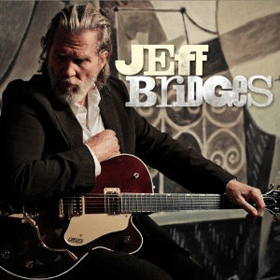Jeff Bridges by Jeff Bridges

2/5
It's hard, and maybe even a little sacrilegious, to fault Jeff Bridges. Coming off an Oscar win for his performance in Crazy Heart and another nomination for his role in True Grit, Bridges has cemented himself in the American iconography. With The Big Lebowski (obligatory viewing for all twenty-somethings) fast outreaching its cult status, Bridges the actor is becoming less discernible from Bridges the man.
Of course, this is only natural. Good actors have roles written for them, roles that utilize their real life personalities. I'm thinking of DeNiro as the frowning tough guy or Cruise as the reckless youth with a heart of gold. The list goes on. As a movie audience, we want our favorite characters to resemble the actors that play them. Call it our need to connect with an archetype, or call it a sort of voyeurism. But what happens when an actor straddles this thin line between illusion and reality?
It is impossible to listen to Jeff Bridges' new album, Jeff Bridges, outside the context of the man's film career. The album arose out of Bridges' role as Bad Blake in Crazy Heart, a movie about a failed country music star, so the connection between Bridges and Blake, is explicit. Less explicit is Bridges’ long hair and scraggly beard. One can't help but feel that Bridges is cashing in on his pop culture pull, that he is trying to create a public image combining Blake, the Dude, and Bridges himself.
The value of Bridges' music aside, what interests me most is the way he approaches the relationship between his person and his persona. His appearance on “The Colbert Report” seemed more like an interview with the Dude than with Jeff Bridges. I'm not sure if Bridges wants to present himself as someone who welcomes the Dude/Blake caricature or someone who has succumbed to it, but the effect is the same: Jeff Bridges looks and acts like his characters we remember best.
This predictability troubled me most while listening to Jeff Bridges. Just because I want Bridges to walk around in a housecoat and jellies doesn't mean he should. Yet, the album feels like Jeff Bridges playing the country musician rather than Jeff Bridges the country musician, making it layered but limited in scope.
Tonally, the music is spot on thanks to T. Bone Burnett, the producer behind the sublime O Brother Where Art Thou soundtrack. And a few songs manage to stand out among the otherwise uniform offerings. "Blue Car" has a nice, rickety but reliable amble reminiscent of front porches and Sunday afternoon, and "The Quest," with its baseball / life metaphor, is toe-tapping enough despite its nod to Fogerty or Mellencamp. But the track, "Slow Boat," one of the few songs Bridges wrote, takes itself too literally. It is a winding six-minute-plus affair that is easy to ignore or block out. What Bridges has done here is more like country music ambiance, and aside from the first and last song, the album never manages to break loose from its sober, straight-forward gait. Bridges doesn't seem to be having too much fun on Jeff Bridges, and the music comes off as a pet project rather than a serious effort.
Jeff Bridges is a talented musician. He has a great voice, knows his way around a guitar and has what it takes to be a performer. Still it might be presumptuous to tag Bridges as a renaissance man. The one highlight of Jeff Bridges is "What a Little Bit of Love Can Do," an extremely catchy tune with gruff but gentle guitars. By placing the song at the beginning, Bridges makes the entire album feel like a vehicle for that single. Unfortunately, the album’s ultimate value comes from its novelty: "Listen to this," we'll say, "it's the Dude playing guitar."
RELATED ARTICLES
Get the most-revealing celebrity conversations with the uInterview podcast!





Leave a comment